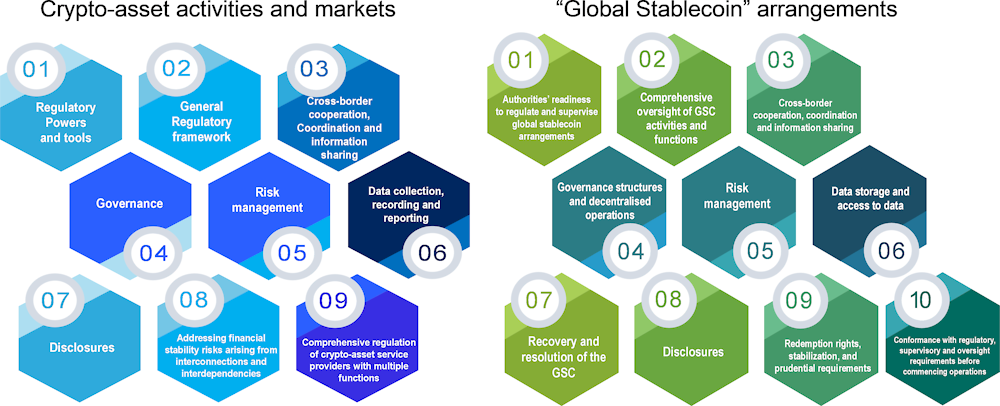Although currently crypto-assets and DeFi are associated with significant risks for markets and their participants, appropriately regulated and supervised crypto-asset providers could in the future be beneficial contributors to the financial market ecosystem. Regulated and compliant stablecoins, for example, could provide an alternative for lower-cost international remittances, an important part of certain AMS financial systems (e.g. the Philippines). Traditional financial market participants may adopt decentralised finance technologies and practices (e.g. atomic settlement of securities or post-trade/clearing disintermediation) to capture potential efficiencies and productivity gains in financial market infrastructure. Robust comprehensive policy frameworks for these activities and markets are necessary to achieve such policy objectives, while they also provide the legal certainty necessary for the industry to reap the benefits of decentralised finance.
Over the past five years, ASEAN policymakers have indeed implemented a wave of reforms to address the digital transformation in financial markets. These reforms typically seek to simplify regulatory regimes to encourage new entrants – entrants that could reach new customers, offer new products, and provide cheaper and faster services – while simultaneously attempting to mitigate risks to the financial system. Since 2020, six AMS (Indonesia, Lao PDR, Malaysia the Philippines, Singapore, and Viet Nam) have introduced new or adjusted rules to govern e-money and e-payment service providers. Thailand has also established rules to govern e-payment service providers, with the introduction of its Payment Systems Act (PSA) in 2017. The use of e-wallets and QR codes for payments in ASEAN is also growing rapidly. Four AMS (Malaysia, the Philippines, Singapore, and Thailand) have recently established a licensing framework for digital banks and have begun pilots in this area. AMS and in particular Cambodia, Indonesia, Thailand, and Singapore are very active in experimentation and pilots of CBDCs.
Policymakers in ASEAN could also consider supporting the safe development of other FinTech applications that could be beneficial for the promotion of financial inclusion, fostering the safe and responsible digital transformation of their markets. This is particularly important when it comes to underserved MSMEs in the region, struggling to access finance. The promotion of the safe use of digital tools as enablers of MSMEs financing in a safe and compliant manner could assist in unlocking capital for productive uses. Such digital tools include inter alia the use of artificial intelligence-based models for credit scoring of thin file clients, such as MSMEs without tangible assets or prior credit history; the use of machine learning applications by development banks granting credit guaranteed loans for fraud detection in the application and screening process; or the deployment of DLT-based finance, such as tokenisation, for capital formation, fractionalisation and for the promotion of efficiencies in capital markets that can benefit all market participants.
Digital finance-related policy frameworks need to carefully balance risks and opportunities. The promotion of digital finance tools as enablers of SME financing needs to be done in a safe and compliant manner, addressing any emerging risks, with a view to allow for the benefits of digitalisation while safeguarding consumers and markets. Innovation facilitators and regulatory sandboxes or other types of participation in public-private co-operation for pilots and experimentation are possible ways for supervisors to stimulate innovation in finance in a controlled manner, while benefitting themselves from interaction with applications of novel mechanisms and technologies (OECD, 2023[60]).
Harmonisation of policy approaches to FinTech in the ASEAN region could be considered as a means to encourage cross-border activity and support innovation at the regional level. Particularly given the diverse level of institutional capacity in the region, more regional and international dialogue could help AMS tap into broader and deeper expertise and to develop policies and instruments that can best support domestic priorities. Where resources allow, AMS could consider establishing units that monitor innovations in financial markets in the relevant authorities.
Investment in skills, training and capacity building is a prerequisite for the successful implementation of any policy in digital finance, both for users (MSMEs in particular) and for policymakers. Users, such as MSMEs, may be willing but not capable to move towards digitalisation, including for their financing needs. Support for the promotion of digital financial literacy is increasingly important to equip users for their digitalisation journey in finance (OECD, 2018[61]).
When it comes to policymakers, resources need to be deployed to keep pace with advances in technology. The upskilling of policymakers is increasingly important given the increasing technical complexity of digital innovation. Enforcement authorities in particular will need to be technically capable of supervising such innovative forms of finance and empowered to intervene when required, but also to enjoy the benefits of digital innovation in RegTech/SupTech applications. Possible capacity constraints may undermine the policy effort and reduce the effectiveness of any global co-ordination not only in terms of addressing current risks (e.g. FSB recommendations in the case of crypto-assets) but also in terms of taking advantage of the benefits of digitalisation in finance.
Nevertheless, FinTech on its own is no panacea, particularly for financial inclusion objectives, and policymakers should also aim at the promotion of efforts in traditional finance. These include, inter alia, infrastructure development where necessary to reach remote areas, work on digital identification by the government for the simplification of KYC checks and onboarding by both traditional and innovative financial institutions, but also the strengthening of traditional credit bureaus to support creditworthiness assessments. FinTech and conventional financial services need to co-exist and interoperate in the wider financial market ecosystem, and the various policy initiatives need to be co-ordinated in that sense.

